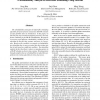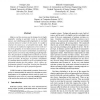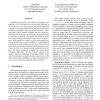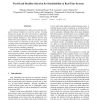150
click to vote
ECRTS
2008
IEEE
15 years 2 months ago
2008
IEEE
Fault tolerance is an important aspect in real-time computing. In real-time control systems, tasks could be faulty due to various reasons. Faulty tasks may compromise the performa...
ECRTS
2008
IEEE
15 years 3 months ago
2008
IEEE
The schedulability testing for the deferrable scheduling algorithm for fixed priority transactions (DS-FP) remains
119
click to vote
ECRTS
2008
IEEE
15 years 3 months ago
2008
IEEE
Modern real-time systems must be designed to be highly adaptable, reacting to aperiodic events in a predictable manner and exhibiting graceful degradation in overload scenarios wh...
131
click to vote
ECRTS
2008
IEEE
15 years 8 months ago
2008
IEEE
Existing off-line schedulability analysis for real-time systems can only handle periodic or sporadic tasks with known minimum inter-arrival times. Modeling sporadic tasks with fi...
139
click to vote
ECRTS
2008
IEEE
15 years 8 months ago
2008
IEEE
Real-time data services can benefit data-intensive real-time applications, e.g., e-commerce, via timely transaction processing using fresh data, e.g., the current stock prices. T...
119
Voted
ECRTS
2008
IEEE
15 years 8 months ago
2008
IEEE
Procedure Positioning is a well known compiler optimization aiming at the improvement of the instruction cache behavior. A contiguous mapping of procedures calling each other freq...
113
Voted
ECRTS
2008
IEEE
15 years 8 months ago
2008
IEEE
Scheduling of sporadic task systems on multiprocessor platforms is an area which has received much attention in the recent past. It is widely believed that finding an optimal sch...
ECRTS
2008
IEEE
15 years 8 months ago
2008
IEEE
129
click to vote
ECRTS
2008
IEEE
15 years 8 months ago
2008
IEEE
Embedded services and applications that interact with the real world often, over time, need to run on different kinds of hardware (low-cost microcontrollers to powerful multicore ...
126
click to vote
ECRTS
2008
IEEE
15 years 8 months ago
2008
IEEE
Task period adaptations are often used to alleviate temporal overload conditions in real-time systems. Existing frameworks assume that only task periods are adjustable and that ta...




